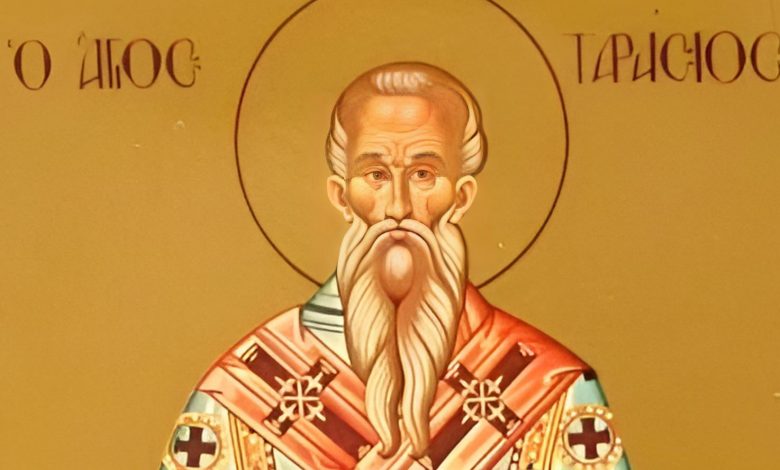Saint Tarasius, Archbishop of Constantinople (25 February)


Saint Tarasius, Patriarch of Constantinople was of illustrious lineage. He was born and raised in Constantinople, where he received a fine education. He was rapidly promoted at the court of the emperor Constantine VI Porphyrogenitos (780-797) and Constantine’s mother, the holy Empress Irene (August 7), and the saint attained the rank of senator.
During these times the Church was agitated by the turmoil of the Iconoclast disturbances. The holy Patriarch Paul (August 30) although he had formerly supported Iconoclasm, later repented and resigned his office. He withdrew to a monastery, where he took the schema. When the holy Empress Irene and her son the emperor came to him, Saint Paul told them that the most worthy successor to him would be Saint Tarasius (who at this time was still a layman).
Tarasius refused for a long time, not considering himself worthy of such high office, but he then gave in to the common accord on the condition, that an Ecumenical Council be convened to address the Iconoclast heresy.
Proceeding through all the clerical ranks in a short while, Saint Tarasius was elevated to the patriarchal throne in the year 784. In the year 787 the Seventh Ecumenical Council was convened in the city of Nicea, with Patriarch Tarasius presiding, and 367 bishops attending. The veneration of holy icons was confirmed at the council. Those bishops who repented of their iconoclasm, were again received by the Church.
Saint Tarasius wisely governed the Church for twenty-two years. He led a strict ascetic life. He spent all his money on God-pleasing ends, feeding and giving comfort to the aged, to the impoverished, to widows and orphans, and on Holy Pascha he set out a meal for them, and he served them himself.
The holy Patriarch fearlessly denounced the emperor Constantine Porphyrigenitos when he slandered his spouse, the empress Maria, the granddaughter of Saint Philaretos the Merciful (December 1), so that he could send Maria to a monastery, thus freeing him to marry his own kinswoman. Saint Tarasius resolutely refused to dissolve the marriage of the emperor, for which the saint fell into disgrace. Soon, however, Constantine was deposed by his own mother, the Empress Irene.
Saint Tarasius died in the year 806. Before his death, devils examined his life from the time of his youth, and they tried to get the saint to admit to sins that he had not committed. “I am innocent of that of which you accuse me,” replied the saint, “and you falsely slander me. You have no power over me at all.”
Mourned by the Church, the saint was buried in a monastery he built on the Bosphorus. Many miracles took place at his tomb.
This Saint was the son of one of the foremost princes in Constantinople, and was originally a consul and first among the Emperor’s private counselors. Then, in 784, he was elected Patriarch of Constantinople by the Sovereigns Irene and her son Constantine Porphyrogenitus. He convoked the Seventh Ecumenical Council that upheld the holy icons, and became the boast of the Church and a light to the clergy. He reposed in 806.
His predecessor, Patriarch Paul, secretly relinquished the throne, entered a monastery and received the schema [The Great Angelic Habit]. Irene and Constantine VI reigned at the time. By Paul’s counsel, Tarasius, who was then a senator and royal advisor, was chosen to be patriarch in the year 783 A.D. He was quickly raised through the ecclesiastical ranks and consecrated as patriarch. A man of great learning and great zeal in the Orthodox Faith, Tarasius reluctantly accepted this rank in order to help Orthodoxy in the struggle against heresies, especially against iconoclasm.
During his reign the Seventh Ecumenical Council [Nicaea, 787 A.D.] was convened. There iconoclasm was condemned, and the veneration of holy icons was confirmed and restored. Tarasius was very charitable toward orphans and the poor, creating shelters and distributing food to them. Toward the powerful, Tarasius was decisive in his defense of faith and morals. When Emperor Constantine banished Maria, his lawful wife, and took a kinswoman to live with him, he sought a blessing for marriage from the patriarch.
Tarasius not only refused him a blessing but first counseled him, then reproached him, and finally forbade him to receive Holy Communion. Before his death, many saw how Tarasius replied to the demons, saying: “I am not guilty of this sin; neither am I guilty of that sin,” until his weakened tongue could not longer speak. He then began to defend himself with his hands, driving away the demons. When he reposed, his face lit up like the sun. This truly great hierarch died in the year 806 A.D. He governed the Church for twenty-two years and four months.
Apolytikion of Tarasius, Patriarch of Constantinople
Fourth Tone
A model of faith and the image of gentleness, the example of your life has shown you forth to your sheep-fold to be a master of temperance. You obtained thus through being lowly, gifts from on high, and riches through poverty. Tarasius, our father and priest of priests, intercede with Christ our God that He may save our souls.
Source: oca.org / goarch.org / westserbdio.org




